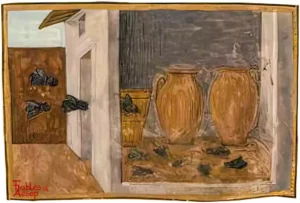Flies were attracted to a honey jar. They ate greedily. But, their feet and wings got covered with the honey so they could not get free. They died.
Too much of a good thing can be bad.
A number of Flies were attracted to a jar of honey. They entered and ate greedily. While feeding, however, their feet and wings got covered with the honey and they could not get free and so died.

Aesop For Children
A jar of honey was upset and the sticky sweetness flowed out on the table. The sweet smell of the honey soon brought a large number of Flies buzzing around. They did not wait for an invitation. No, indeed; they settled right down, feet and all, to gorge themselves. The Flies were quickly smeared from head to foot with honey. Their wings stuck together. They could not pull their feet out of the sticky mass. And so they died, giving their lives for the sake of a taste of sweetness.
Moral
Be not greedy for a little passing pleasure. It may destroy you.

Townsend version
A number of Flies were attracted to a jar of honey which had been overturned in a housekeeper’s room, and placing their feet in it, ate greedily. Their feet, however, became so smeared with the honey that they could not use their wings, nor release themselves, and were suffocated. Just as they were expiring, they exclaimed, “O foolish creatures that we are, for the sake of a little pleasure we have destroyed ourselves.”
Moral
Pleasure bought with pains, hurts.

L’Estrange version (Wasps in a Honey-pot)
There was a whole swarm of wasps got into a honey-pot, and there they cloy’d and clamm’d themselves, till there was no getting out again; which brought them to understand in the conclusion, that they had pay’d too deare for their sweet-meats.
Moral
Loose pleasures become necessary to us by the frequent use of them, and when they come once to be habitual, there’s no getting clear again.

Gherardo Image from 1480

Muscae et Mel
Ad mel, profusum in cella quadam, advolantes, muscae illius dulcissimo succo iucundissime pascebantur. Sed iam saturae, cum avolare vellent, pedibus nitentibus, etiam alis in tenace liquore haerentibus, moriturae, “O miserae,” inquiunt, “quantillus nobis cibus interitum attulit.”
Perry #080
